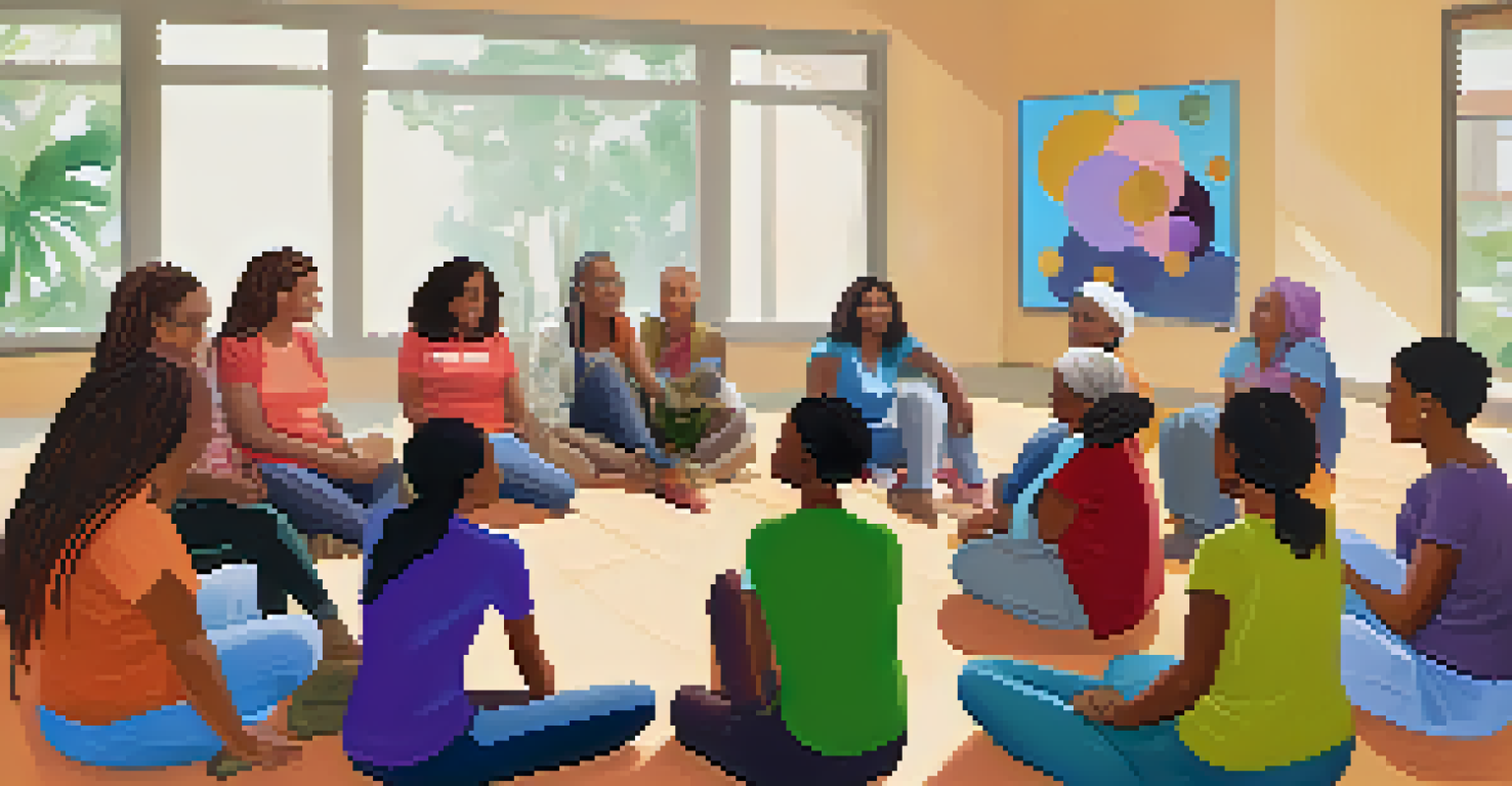Menopause: Empowering Women Through Education and Awareness

Understanding Menopause: A Natural Transition
Menopause is a natural phase in a woman's life, typically occurring between the ages of 45 and 55. It marks the end of menstruation and fertility, resulting from hormonal changes, particularly a decline in estrogen levels. While this transition can bring about various physical and emotional changes, understanding it can greatly reduce anxiety surrounding the process.
Menopause is a natural part of life; it’s a transition, not a crisis.
Many women experience symptoms like hot flashes, mood swings, and sleep disturbances. However, each woman's experience is unique, and not everyone will face the same challenges. Education is vital as it helps women recognize these symptoms and understand that they are a natural part of life, rather than something to be feared.
By fostering a deeper understanding of menopause, women can approach this stage with knowledge and confidence. This empowers them to seek support, explore treatment options, and maintain a positive outlook during this significant life transition.
Common Symptoms and Their Impact
The symptoms of menopause can vary widely but often include hot flashes, night sweats, mood fluctuations, and vaginal dryness. These changes can affect daily life, making it challenging for women to perform everyday tasks or enjoy social activities. Recognizing and addressing these symptoms is crucial for maintaining quality of life.

For instance, hot flashes can be particularly disruptive, causing discomfort in professional settings or during social gatherings. Understanding these symptoms allows women to communicate their needs and seek solutions, whether through lifestyle adjustments or medical interventions.
Menopause is a Natural Transition
Understanding menopause helps women navigate this life stage with confidence and reduces anxiety about its symptoms.
Additionally, awareness of these symptoms can foster empathy and support among family and friends. Open conversations about menopause can break down the stigma and help create a supportive environment where women feel comfortable discussing their experiences.
The Role of Education in Menopause Management
Education plays a pivotal role in managing menopause effectively. With accurate information, women can make informed decisions about their health and wellness strategies. This encompasses everything from lifestyle changes, such as diet and exercise, to exploring hormone replacement therapy and alternative treatments.
The only way to deal with menopause is to embrace it and accept the changes that come with it.
Women's health organizations and healthcare providers are crucial in delivering this education. They can provide resources, workshops, and counseling that empower women to take charge of their health during menopause. Knowledge is empowering and can significantly diminish feelings of helplessness.
Moreover, educational initiatives can also address misconceptions about menopause. By sharing factual information, we can dispel myths and promote a more balanced understanding of this life stage, fostering a supportive community.
Open Conversations: Breaking the Stigma
Historically, menopause has been a taboo topic, often shrouded in silence and stigma. This lack of discussion can leave women feeling isolated or misunderstood. By encouraging open conversations about menopause, we can create a culture of support and understanding that benefits everyone.
Talking about menopause openly can help reduce feelings of embarrassment and shame. Women sharing their experiences can normalize the conversation and show others they are not alone in their struggles. This camaraderie fosters a sense of community and empowerment.
Education Empowers Women
Accurate information about menopause enables women to make informed health decisions and dispel misconceptions.
Encouraging dialogue about menopause also allows for increased awareness among younger generations. By educating young women about what to expect, we can prepare them for this inevitable life stage, helping them approach it with confidence when the time comes.
Lifestyle Changes to Ease Menopausal Symptoms
Implementing lifestyle changes can significantly alleviate menopausal symptoms and improve overall well-being. Simple adjustments, such as regular exercise, a balanced diet, and stress management techniques, can help women navigate this transition more smoothly. Exercise, for example, can enhance mood and combat weight gain.
Incorporating foods rich in phytoestrogens, like soy products, can also be beneficial. These plant-based compounds can mimic estrogen in the body, potentially easing some symptoms. Additionally, staying hydrated and avoiding triggers such as caffeine and alcohol can make a noticeable difference.
Mindfulness practices, such as yoga and meditation, can also be powerful tools during menopause. They promote relaxation and help in managing stress, which can exacerbate symptoms. By embracing a holistic approach to health, women can empower themselves to thrive during this transition.
Support Networks: Finding Your Community
Building a supportive network can make all the difference during menopause. Whether it’s connecting with friends, joining local support groups, or participating in online forums, having a community to share experiences with can provide comfort and encouragement. Support networks allow women to express their feelings and exchange valuable coping strategies.
Healthcare professionals also play an essential role in these networks. They can offer guidance, resources, and a safe space for women to discuss their concerns. Having a trusted healthcare provider who understands menopause can significantly ease the transition.
Support Networks are Essential
Building a community and seeking professional help can provide comfort and effective coping strategies during menopause.
Additionally, family support is crucial. Encouraging partners, children, and friends to learn about menopause can foster understanding and empathy, creating a more nurturing environment for women experiencing this life stage.
Seeking Professional Help: When to Reach Out
While education and support are vital, there are times when professional help is necessary. If menopausal symptoms become overwhelming or interfere with daily life, seeking medical advice is essential. Healthcare providers can offer tailored treatment plans that address individual needs, whether through hormone therapy, medication, or alternative therapies.
It's important to remember that each woman's experience with menopause is unique, and what works for one may not work for another. Consulting with a knowledgeable healthcare professional allows for personalized approaches to symptom management, ensuring that each woman feels heard and supported.

Recognizing when to seek help is empowering. It demonstrates a commitment to one's health and well-being, allowing women to take control of their menopause journey and thrive through this life stage.